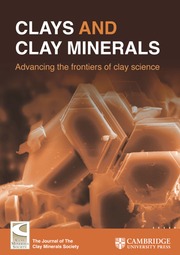Crossref Citations
This article has been cited by the following publications. This list is generated based on data provided by
Crossref.
Wang, Ling
Zhang, Ming
and
Redfern, Simon A. T.
2003.
Infrared Study of CO2 Incorporation into Pyrophyllite [Al2Si4O10(OH)2] during Dehydroxylation.
Clays and Clay Minerals,
Vol. 51,
Issue. 4,
p.
439.
Stackhouse, Stephen
Coveney, Peter V.
and
Benoit, David M.
2004.
Density-Functional-Theory-Based Study of the Dehydroxylation Behavior of Aluminous Dioctahedral 2:1 Layer-Type Clay Minerals.
The Journal of Physical Chemistry B,
Vol. 108,
Issue. 28,
p.
9685.
Gualtieri, A. F.
and
Ferrari, S.
2006.
Kinetics of illite dehydroxylation.
Physics and Chemistry of Minerals,
Vol. 33,
Issue. 7,
p.
490.
Amritphale, S.S.
Bhasin, Sanjeev
and
Chandra, Navin
2006.
Energy efficient process for making pyrophyllite-based ceramic tiles using phosphoric acid and mineralizers.
Ceramics International,
Vol. 32,
Issue. 2,
p.
181.
Ter Heege, J. H.
and
Renner, J.
2007.
In situ impedance spectroscopy on pyrophyllite and CaCO3 at high pressure and temperature: phase transformations and kinetics of atomistic transport.
Physics and Chemistry of Minerals,
Vol. 34,
Issue. 7,
p.
445.
Burzo, E.
2007.
Phyllosilicates.
p.
59.
Tunega, Daniel
Goodman, Bernard A.
Haberhauer, Georg
Reichenauer, Thomas G.
Gerzabek, Martin H.
and
Lischka, Hans
2007.
Ab initio calculations of relative stabilities of different structural arrangements in dioctahedral phyllosilicates.
Clays and Clay Minerals,
Vol. 55,
Issue. 2,
p.
220.
Wang, L.
Fan, H.
Liu, J.
Dan, H.
Ye, Q.
and
Deng, M.
2007.
Infrared spectroscopic study of modern and ancient ivory from sites at Jinsha and Sanxingdui, China.
Mineralogical Magazine,
Vol. 71,
Issue. 5,
p.
509.
Lantenois, S.
Beny, J.-M.
Muller, F.
and
Champallier, R.
2007.
Integration of Fe in natural and synthetic Al-pyrophyllites: an infrared spectroscopic study.
Clay Minerals,
Vol. 42,
Issue. 1,
p.
129.
Molina-Montes, Esther
Timón, Vicente
Hernández-laguna, Alfonso
and
Sainz-díaz, C. Ignacio
2008.
Dehydroxylation mechanisms in Al3+/Fe3+ dioctahedral phyllosilicates by quantum mechanical methods with cluster models.
Geochimica et Cosmochimica Acta,
Vol. 72,
Issue. 16,
p.
3929.
Molina-Montes, Esther
Donadio, Davide
Hernández-Laguna, Alfonso
Sainz-Díaz, C. Ignacio
and
Parrinello, Michele
2008.
DFT Research on the Dehydroxylation Reaction of Pyrophyllite 1. First-Principle Molecular Dynamics Simulations.
The Journal of Physical Chemistry B,
Vol. 112,
Issue. 23,
p.
7051.
Molina-Montes, Esther
Donadio, Davide
Hernández-Laguna, Alfonso
and
Sainz-Díaz, C. Ignacio
2008.
DFT Research on the Dehydroxylation Reaction of Pyrophyllite 2. Characterization of Reactants, Intermediates, And Transition States along the Reaction Path.
The Journal of Physical Chemistry A,
Vol. 112,
Issue. 28,
p.
6373.
Hajjaji, M.
Belkabir, A.
and
Berrada, S.H.
2008.
Peraluminous rocks of Bou-Azzer region (Morocco): Geology and firing transformations.
Journal of African Earth Sciences,
Vol. 52,
Issue. 3,
p.
114.
Mukhopadhyay, T.K.
Ghatak, S.
and
Maiti, H.S.
2009.
Effect of pyrophyllite on the mullitization in triaxial porcelain system.
Ceramics International,
Vol. 35,
Issue. 4,
p.
1493.
Wilson, Moira A.
Carter, Margaret A.
Hall, Christopher
Hoff, William D.
Ince, Ceren
Savage, Shaun D.
Mckay, Bernard
and
Betts, Ian M.
2009.
Dating fired-clay ceramics using long-term power law rehydroxylation kinetics.
Proceedings of the Royal Society A: Mathematical, Physical and Engineering Sciences,
Vol. 465,
Issue. 2108,
p.
2407.
Molina-Montes, Esther
Donadio, Davide
Hernández-Laguna, Alfonso
and
Sainz-Díaz, C. Ignacio
2010.
Exploring the Rehydroxylation Reaction of Pyrophyllite by Ab Initio Molecular Dynamics.
The Journal of Physical Chemistry B,
Vol. 114,
Issue. 22,
p.
7593.
Sperinck, Shani
Raiteri, Paolo
Marks, Nigel
and
Wright, Kate
2011.
Dehydroxylation of kaolinite to metakaolin—a molecular dynamics study.
J. Mater. Chem.,
Vol. 21,
Issue. 7,
p.
2118.
Muñoz-Santiburcio, D.
Kosa, M.
Hernández-Laguna, A.
Sainz-Díaz, C. I.
and
Parrinello, M.
2012.
Ab Initio Molecular Dynamics Study of the Dehydroxylation Reaction in a Smectite Model.
The Journal of Physical Chemistry C,
Vol. 116,
Issue. 22,
p.
12203.
Hall, Christopher
Hamilton, Andrea
and
Wilson, Moira A.
2013.
The influence of temperature on rehydroxylation [RHX] kinetics in archaeological pottery.
Journal of Archaeological Science,
Vol. 40,
Issue. 1,
p.
305.
Skoubris, Evangelos N.
Chryssikos, Georgios D.
Christidis, George E.
and
Gionis, Vassilis
2013.
Structural Characterization of Reduced-Charge Montmorillonites. Evidence Based on FTIR Spectroscopy, Thermal Behavior, and Layer-Charge Systematics.
Clays and Clay Minerals,
Vol. 61,
Issue. 2,
p.
83.


